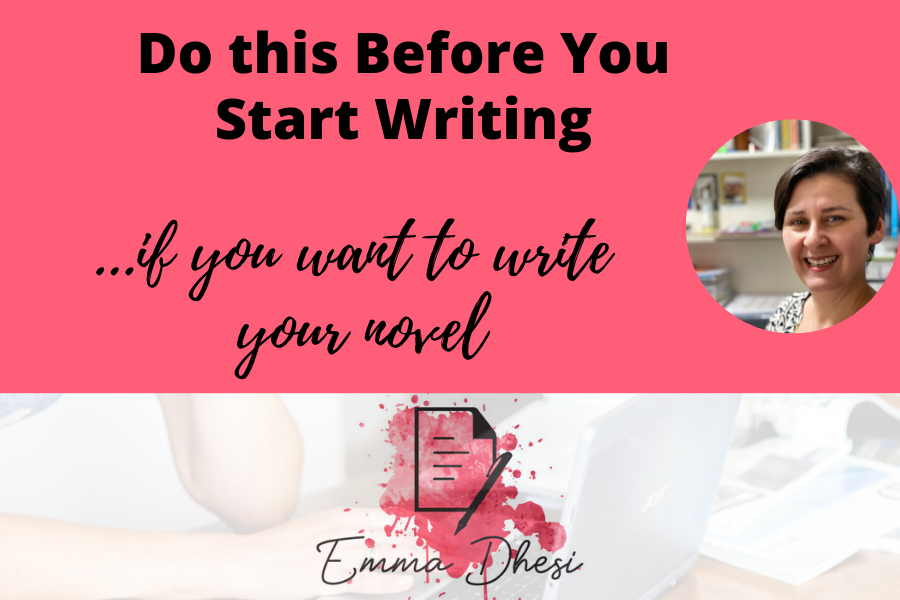From time to time, I link to products or services I love using with affiliate links. This means that I may receive a small percentage or fee for referring you to any product you may purchase from one of those sites. It does not cost you anything. These small fees help sustain my small business. I truly appreciate your support.
What do you do before you start writing?
Writing a book is daunting. If you’re a beginner writer, it’s difficult to know what to do before you start writing.
Do you begin with a detailed plot? In-depth character profiles? World building?
Nope! None of that. It is much simpler. Before you start writing you need to ‘mull’.
To mull or not to mull!
Mull your idea around in your head for a while.
This is the very basis of what more advanced writers call a premise, but for simplicitie’s sake, let’s just call it, ‘mulling it over’.
What should you mull over?
Primarily you want to mull over the who, what, where and when of your story.
Mulling it over might sound super simple and a bit lazy, but that is really how writers begin.
The idea for a story might begin with a photo still in your head or the snippet of a moving image.
Perhaps it is an overheard conversation, or even just a feeling, but that is where it begins. The writer then mulls it over and builds the idea up, slowly but surely, into a fully fledged storyline.
It is now a famous bit of folklore that Stephanie Meyers’ Twilight series was sparked by a dream.
Audrey Niffenegger‘s first book The Time Travellers Wife started off as just a title.
Rather randomly, Leo Tolstoy had the vision of an elbow, and that elbow eventually developed into Anna Karenina.
Other writers base their stories in their own lives and the people they meet. By all accounts, the “things” in Maurice Sendak’s famous children’s book Where The Wild Things Are, were based on family members he didn’t like!

My new novel, Belonging, is about an adopted boy going through a crisis of identity. It started with me wondering if my own adopted son will struggle with his identity when he gets older.
The idea preoccupied me for a long time (it still does), and I mulled over this fictional boy for a long time before sitting down to write.
Once you’ve mulled over your basic storyline for long enough and feel comfortable that you know roughly where your writing is headed, the next step is to put a stake on the ground.
The stake in the ground
This is more important than it sounds. The reason being, writing can be really tough. Don’t get me wrong, for those of us who love to write it is super rewarding, but there’s no doubt it is challenging.
Because of that, you really do have to ask yourself if you wanted to write and if now is the time. I strongly believe that now is the time because, in all honesty, there is never a right time. We never have our ducks lined up nice and neatly, offering us empty time to write. So the time is always now.
But! You must put that line in the sand and tell yourself that you’re going to turn up and do the writing when you say you are.
This doesn’t mean you’re sitting down everyday writing thousands of words, a la Stephen King. It means that you will write when you say you will write.
Are you someone who puts themselves at the bottom of the to-do list? Do you have a full-time job? Do you have children or other caring responsibilities? When you’re busy, it’s too easy to put your needs at the end of the list.
Make yourself a priority
As Jess from Mindful Galaxy reminds us, prioritising yourself is not a luxury, it’s an essential. This doesn’t mean neglecting your responsibilities or your family, it means knowing your limits and taking a step back when you need to.
It means asking for help when you need it and not feeling like a failure. Asking for help is hard, and when you do it shows real strength.
She recommends putting time aside for yourself and it it’s writing you love, put time aside for that. Head to a café, hide in your bedroom, find a little nook in your local library. Give yourself some physical space.
By giving yourself physical space, you’re also give yourself mental space. This will be your opportunity to switch off from your day-to-day stresses and venture out into your imaginary world.
If you do these two things:
- Mull
- Put a stake in the ground
before you start writing, you’ll be giving yourself the best chance of getting to the end of your story.
Don’t forget, figure out the who, what, where and when of your story and make a deal with yourself that you will do your writing when you say you will.
If this article was useful, you’ll love:
If you’ve been working on your novel for years (perhaps even decades) the maybe it's time to consider working with a coach.
If you have multiple versions of your novel and you don’t know which works best, are scared nobody will like your book and don't feel like a 'real' writer, then my guess is coaching is the right next step for you.
Find out more and sign up for your free Clarity Call here: https://emmadhesi.com/personal-coaching/

Emma Dhesi writes women’s fiction. She began writing seriously while a stay at home mum with 3 pre-school children.
By changing her mindset, being consistent and developing confidence, Emma has gone from having a collection of handwritten notes to a fully written, edited and published novel.
Having experienced first-hand how writing changes lives, Emma now helps beginner writers find the time and confidence to write their first novel.





